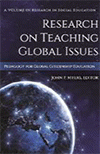
Research on Teaching Global Issues
Pedagogy for Global Citizenship Education
Edited by:
John P. Myers, Florida State University
A volume in the series: Research in Social Education. Editor(s): Brad M. Maguth, The University of Akron.
Published 2020
This edited book is the first full-length volume exclusively devoted to new research on the challenges and practices of teaching global issues. It addresses the ways that schools can and do address young people’s interest and activism in contemporary global issues facing the world. Many young people today are passionate about issues such as climate change, world poverty, and human rights but have few opportunities in schools to study such issues in depth. This book draws on new research to provide a deeper understanding and examples of how global issues are taught in schools.
The book is organized in two sections: (1) contexts and policies in which global issues are taught and learned; and (2) case studies of teaching and learning global issues in schools. The central thesis is that global issues are an essential feature of democracy and social action in a world caught in the thrall of globalization. Schools can no longer afford to ignore teaching about issues impacting across the world if they intend to keep young people engaged in learning and want them to make their own communities—and the greater world—better places for all.
CONTENTS
Preface: Understanding the Landscape of Teaching Global Issues, John P. Myers. SECTION I: CONTEXTS AND POLICY FOR TEACHING GLOBAL ISSUES. Re- and Decontextualizing Global Citizenship Education: Systematic Analysis of the Scholarship in the Field, Miri Yemini, Heela Goren, and Felisa Tibbitts. A Global Youth Deliberation and Their International Youth Position Paper on Global Citizenship, Lynette Shultz, Thashika Pillay, Carrie Karsgaard, and Karen Pashby. The Impact of the C3 Framework on the Development of Global Dimensions in Citizenship Education in State Social Studies Standards, Anatoli Rapoport. SECTION II: CASE STUDIES OF TEACHING GLOBAL ISSUES. Fairtrade Schools and Global Learning in the United Kingdom, Douglas Bourn. The Art of Global Education: Using Socially Conscious Art to Develop Global Perspectives, Bárbara C. Cruz, Cheryl R. Ellerbrock, Sarah M. Denney, and Cristina M. Viera. The Role of Voice, Values, and Volunteerism in Teaching Global Issues in Singapore, Mark Baildon and Sandra Bott. Satisfying Surprises: A Conceptual Model for Cultural Self-Awareness in Simulations, Nick Bardo. Reinstating Global Citizenship Education: Conceptual, Curricular, and Pedagogical Considerations on Teaching Global Issues in Hong Kong’s Curriculum and School Teaching, Eric King-man Chong. About the Authors.
REVIEWS
"In sum, Research in Teaching Global Issues spans far-reaching GCE-related topics ranging from teacher education to student engagement, from curriculum frameworks to an interdisciplinary whole-school approach, from school-university partnerships to innovative global studies programs, and from new conceptual models to novel pedagogical practices. For aspiring and established GCE scholars, the book offers insight into recent related literature and an opportunity to consider and analyze new perspectives. For teachers, department chairs, and directors of curriculum and instruction, the book offers lessons from on-point case studies. And, for scholar-practitioners, it is a how-to guide to translate research into practice and reflect on the multi-purpose value of GCE." Evan Saperstein William Paterson University in Journal of International Social Studies (Read full review)
-
Paperback978-1-64802-051-3
Web price: $45.04 (Reg. 52.99)
-
Hardcover978-1-64802-052-0
Web price: $80.74 (Reg. 94.99)
- eBook978-1-64802-053-7

- EDU029000 - EDUCATION: TEACHING METHODS & MATERIALS: General
- EDU037000 - EDUCATION: Research
- EDU016000 - EDUCATION: History
-
 (Re)Envisioning Social Studies Education Research
Current Epistemological and Methodological Expansions, Deconstructions, and Creations
(Re)Envisioning Social Studies Education Research
Current Epistemological and Methodological Expansions, Deconstructions, and Creations
-
 Controversial Issues in Social Studies Education in Turkey
The Contemporary Debates
Controversial Issues in Social Studies Education in Turkey
The Contemporary Debates
-
 Perspectives of Black Histories in Schools
Perspectives of Black Histories in Schools
-
 Repensar la Educación para un Mundo Global y Transcultural
Repensar la Educación para un Mundo Global y Transcultural
-
 Research in Global Citizenship Education
Research in Global Citizenship Education
-
 Research on Global Citizenship Education in Asia
Conceptions, Perceptions, and Practice
Research on Global Citizenship Education in Asia
Conceptions, Perceptions, and Practice
-
 Social Studies Teacher Education
Critical Issues and Current Perspectives
Social Studies Teacher Education
Critical Issues and Current Perspectives

